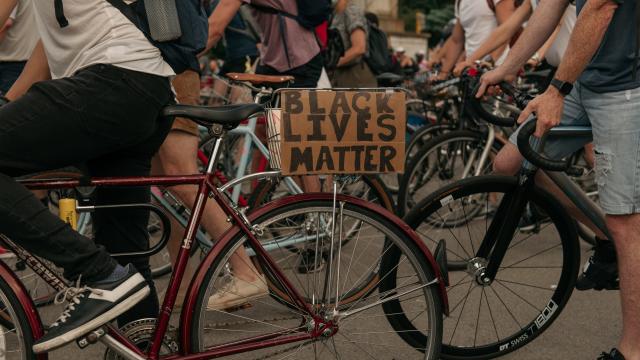The Movement for Black Lives (M4BL) and the environmental movement have not always walked release of the BREATHE Act, a suite of policy proposals, on Tuesday.
While the document includes expected demands, such as the reallocation of federal taxpayer dollars from discriminatory policing to community-led approaches, it also includes some that are squarely focused on environmental justice. Among them is a call for the U.S. government to allocate new funds toward building “healthy, sustainable and equitable communities.”
[referenced url=”https://gizmodo.com.au/2020/06/pollution-is-racial-violence/” thumb=”https://gizmodo.com.au/wp-content/uploads/2020/06/09/racial-violence-300×157.png” title=”Pollution Is Racial Violence” excerpt=”Today, Black families in the U.S. are most likely to live surrounded by toxic air pollutants extractive industries discharge into their backyards. Black people face a more immediate threat whenever they leave their homes: the police. To disconnect the two is irresponsible. Polluting industries don’t wind up in Black communities…”]
The mainstream environmental movement has only recently become an ally in protecting Black lives. That’s largely thanks to the Black advocates who pushed environmental organisations to centre environmental justice. Black Americans have long suffered at the hands of polluting industries, and fossil fuel giants continue to push for dirty projects in predominantly Black neighbourhoods. When it comes to prisons, which disproportionately house Black people, they are often vulnerable to extreme weather events climate change fuels like hurricanes. The connections between Black lives, the prison industrial complex, and the climate crisis are stark. Now, the M4BL is trying to make sure our elected officials quit ignoring the linkages by rolling out a suite of proposals it’s calling the BREATHE Act.
The policy framework, which is supported by Reps. Ayanna Pressley and Rashida Tlaib though they haven’t introduced legislation at this point, outlines this environmental vision in its third section. The M4BL proposal calls for the federal government to establish an environmental justice grant that incentivizes states and municipalities to invest in free public transportation for students, urban gardens, access to clean and safe water and air, comprehensive healthcare, and “clean, renewable, and zero-emission energy sources.”
The BREATHE Act also calls for federal resources going toward community-based groups that are often leading critical work to create healthier neighbourhoods and funding projects that improve climate resiliency among Black communities so that they’re not at increased risk from hurricanes, flooding, and wildfires. Standing in solidarity with Indigenous peoples, the M4BL notes that these funds should also aim to protect and restore cultural assets and sacred sites. Private companies often ignore the existence of these sites when building their infrastructure, and Indigenous communities have also faced widespread disinvestment across the U.S.
[referenced url=”https://gizmodo.com.au/2020/06/there-is-no-climate-justice-without-defunding-the-police/” thumb=”https://gizmodo.com.au/wp-content/uploads/2020/06/03/w0tgwsla7w4s9n5vxae3-300×169.jpg” title=”There Is No Climate Justice Without Defunding the Police” excerpt=”The U.S. has erupted in protests over the brutal killing of George Floyd by police. The protests have largely been peaceful. The police response has not.”]
The climate crisis is a racial justice issue. For too long, these two movements have operated separately. However, it’s becoming increasingly clear to both civil rights leaders and environmental advocates that the solutions for their individual causes are directly in line with one another. By defunding racist police forces and putting that money into community needs such as solar panels, lead-free water pipes, or affordable housing, these movements can address two problems at once. Ultimately, the root of both issues lies in the deep-held systemic racism that places a higher value on some lives over others and prioritises private profit over people.
Should an elected official introduce the BREATHE Act into Congress, the U.S. will be one step closer to preparing for the climate crisis while centering the needs of Black communities. This will be a sharp contrast to the U.S. history of exploiting these communities and using them as sacrifice zones.
